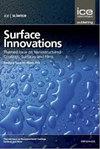Anticorrosion and surface evaluation of some electrodeposited Ni-Co-TiO2 nanocomposite coatings in 3.5 wt. % NaCl solutions
IF 3.5
4区 材料科学
Q3 CHEMISTRY, PHYSICAL
引用次数: 0
Abstract
Herein, we are interested to provide the synthetic methodologies, chemical properties, and the corrosion performance of some Ni-xCo-yTiO2 nanocomposite electroplated on Cu using the gluconate-cysteine bath, pointing at the classification of these materials corresponding to their stability in that simulated marine solution and recommend using these materials in such aggressive media. Electrochemical and spectroscopic measurements were employed in 3.5 wt. % NaCl electrolytes at 25°C. The electrochemical properties of the applicable nanocomposite material will be studied to enhance manufacturing technology and forecast the stability of structures made from it. The produced nanocomposite coatings have been demonstrated to have high corrosion resistance in the investigated electrolyte, which is commonly utilized in hydrogen evolution reaction applications and other novel materials corrosion investigations. By characterizing the corrosion performance of the examined Ni-xCo-yTiO2 nanocomposite coatings in 3.5 wt.% NaCl solution, the Ni-48Co-3.8TiO2 is regarded as the most stable electrode. The results exposed that the inclusion of Co inside Ni-xCo-yTiO2 significantly lessened the corrosion rate of the investigated composites. The surface examination revealed the presence of several materials constituents in the passive layer. DFT and Monte Carlo simulation approaches have been used to investigate and analyze the relationship between molecular structure and inhibitory effect.镍-钴-二氧化钛纳米复合镀层的防腐性能及表面评价。% NaCl溶液
在此,我们有兴趣提供一些使用葡萄糖酸半胱氨酸浴在Cu上电镀的Ni-xCo-yTiO2纳米复合材料的合成方法,化学性质和腐蚀性能,指出这些材料在模拟海洋溶液中的稳定性对应的分类,并推荐这些材料在这种腐蚀性介质中使用。采用电化学和光谱测量3.5 wt。% NaCl电解液,25°C。研究适用的纳米复合材料的电化学性能,以提高制造技术,并预测其结构的稳定性。制备的纳米复合涂层在电解液中具有较高的耐腐蚀性,可用于析氢反应和其他新型材料的腐蚀研究。通过对Ni-xCo-yTiO2纳米复合涂层在3.5 wt下的腐蚀性能进行表征。在% NaCl溶液中,Ni-48Co-3.8TiO2被认为是最稳定的电极。结果表明,在Ni-xCo-yTiO2中加入Co可显著降低复合材料的腐蚀速率。表面检查显示在钝化层中存在几种材料成分。利用DFT和蒙特卡罗模拟方法研究和分析了分子结构与抑制效果之间的关系。
本文章由计算机程序翻译,如有差异,请以英文原文为准。
求助全文
约1分钟内获得全文
求助全文
来源期刊

Surface Innovations
CHEMISTRY, PHYSICALMATERIALS SCIENCE, COAT-MATERIALS SCIENCE, COATINGS & FILMS
CiteScore
5.80
自引率
22.90%
发文量
66
期刊介绍:
The material innovations on surfaces, combined with understanding and manipulation of physics and chemistry of functional surfaces and coatings, have exploded in the past decade at an incredibly rapid pace.
Superhydrophobicity, superhydrophlicity, self-cleaning, self-healing, anti-fouling, anti-bacterial, etc., have become important fundamental topics of surface science research community driven by curiosity of physics, chemistry, and biology of interaction phenomenon at surfaces and their enormous potential in practical applications. Materials having controlled-functionality surfaces and coatings are important to the manufacturing of new products for environmental control, liquid manipulation, nanotechnological advances, biomedical engineering, pharmacy, biotechnology, and many others, and are part of the most promising technological innovations of the twenty-first century.
 求助内容:
求助内容: 应助结果提醒方式:
应助结果提醒方式:


